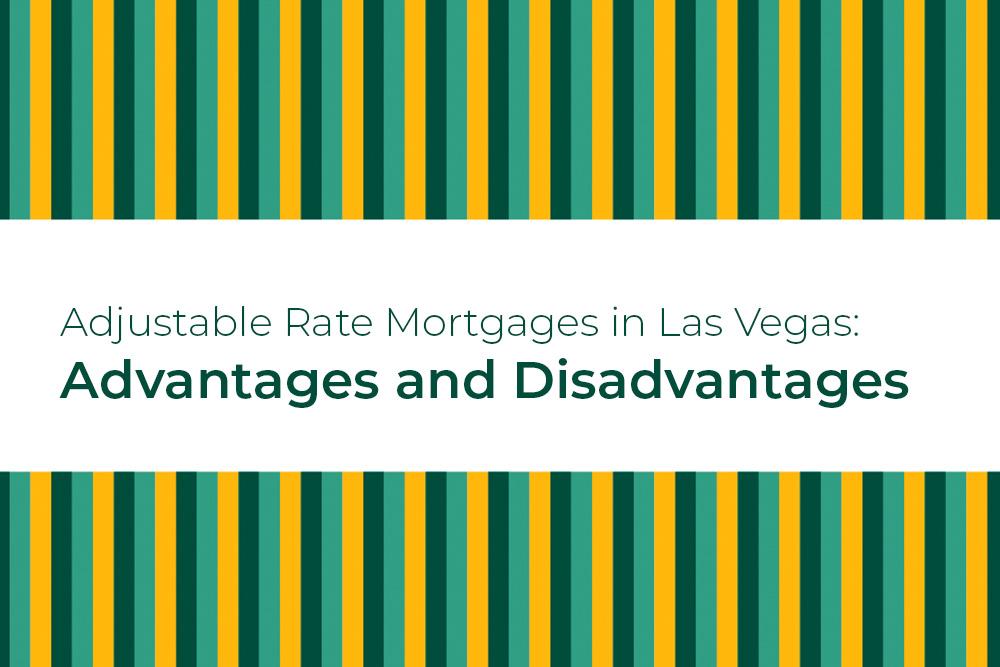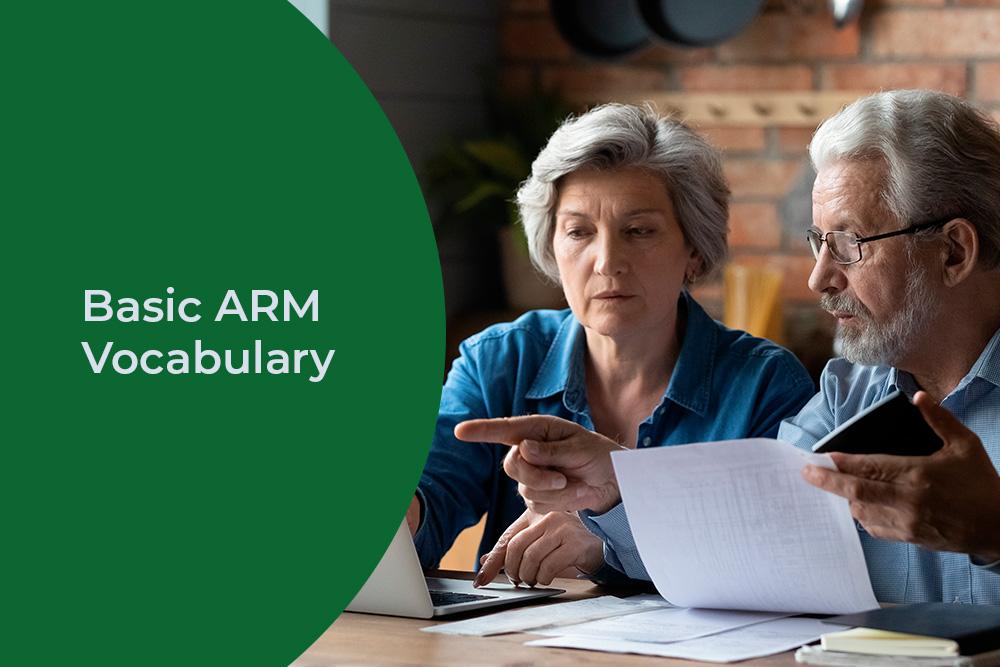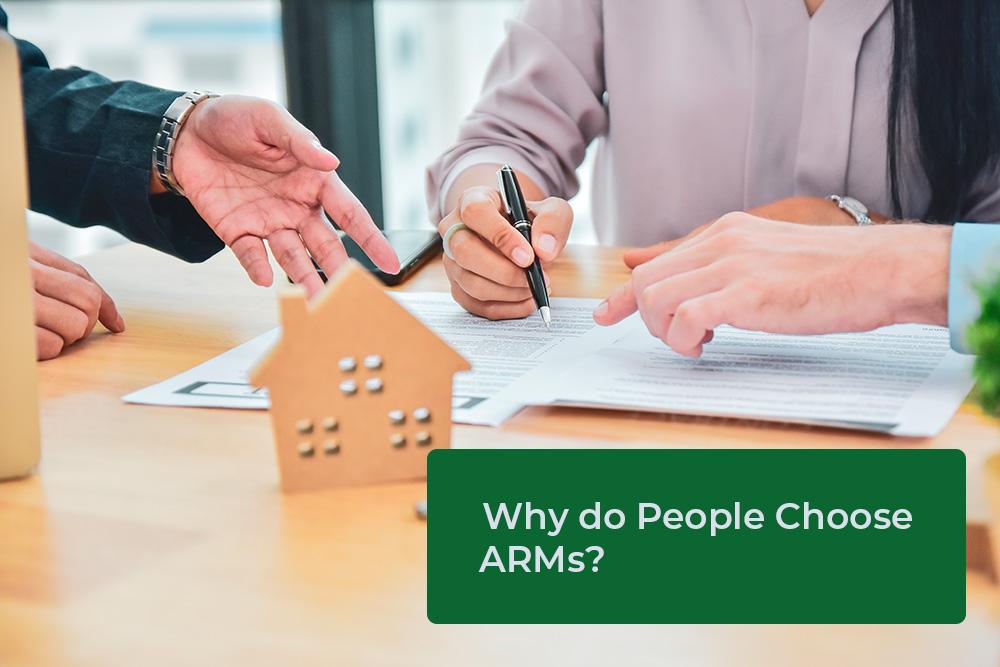Adjustable Rate Mortgages in Las Vegas: Advantages and Disadvantages

Homeowners have several options when they are considering loans in Las Vegas. One is an adjustable-rate mortgage or an “ARM”. An ARM is a mortgage with fluctuating interest rates. An ARM is a flexible mortgage with an interest rate set for a fixed period. After that time, the interest rate can increase or decrease.
Understanding an Adjustable-Rate Mortgage
An adjustable-rate mortgage has a variable, fixed-rate period that lasts anywhere from one month to 10 years. Usually, the shorter the adjustment period is for a loan, the lower the initial Las Vegas mortgage rates are. Once the initial period is up for an ARM interest rate, the interest rate can change. When this happens, the interest rate will again be set for a certain period of time with the new rate locked in. As with when the loan initially started, the adjusted interest rate will stay the same until the rate changes again. Note that the interest rate can either be higher or lower in subsequent periods. If you can’t afford a higher interest rate or don’t like the uncertainty of not knowing what your interest payments will be, you may want to stick with fixed-rate loans in Las Vegas, which give you a set interest over the course of the loan’s lifetime. If you’re unsure which one is the right choice, mortgage lenders in Las Vegas can provide some guidance.
Basic ARM Vocabulary

When you hear mortgage lenders in Las Vegas talk about ARM mortgages, chances are good, you’ll hear some common words used to describe the mortgages. To get a better understanding of what kind of mortgage you’re getting into, you may want to learn a few basic vocabulary words first, including the following terms:
- Adjustment frequency
- Adjustment index
- Margin
- Caps
- Ceiling
The term “adjustment frequency” is how often an interest rate adjustment occurs. When the adjustment frequency changes, it marks the start of a new interest rate adjustment period, and this timeframe can be months or years.
An adjustment index is a benchmark. The interest rate adjustment index can be the interest rate on a specific type of asset, such as a certificate of deposit or a Treasury bill. The adjustment index can also refer to a specific index, such as the Cost of Funds, Secured Overnight Financing Rate, or the London Interbank Offered Rate.
The margin is another term commonly used when talking about an ARM. A margin is a rate you pay when you sign a loan slightly more than the adjustment index. For instance, the adjustable rate may be by the one-year Treasury bill rate plus an additional two percent, and the additional percentage is the margin.
A cap is another ARM term. A cap is the maximum amount an interest rate can change in a set period. A cap may apply to monthly payments on the loan as well. In that case, the loan is called a negative amortization loan. With this kind of loan, you can look forward to lower payments that don’t cover the total amount of the interest. Any unpaid interest goes towards paying the principal.
The ceiling is another term loan officers use when discussing ARM mortgages. A ceiling is the maximum amount an adjustable interest rate can reach over the lifetime of the loan.
Why do People Choose ARMs?

There are several reasons to consider getting an ARM over a fixed-rate mortgage. One is the cost. ARMs are generally less expensive than fixed-rate mortgages, at least initially for the first few years. You don’t have to make high initial payments with ARMs, which means you may also qualify for a larger loan. You may also end up with mortgage rates in Las Vegas that fall over the course of the loan’s lifetime rather than increase. If you take out an ARM loan, you may have a payment of several hundred dollars per month for a set time period of up to seven years. After that time, interest rates may or may not increase. However, market rates determine the interest rate. Flexibility is another benefit of an ARM. If you’re thinking of selling your home in the next few years, for instance, you may prefer to have a loan with more flexible terms like an ARM. Although interest rates can rise with an ARM, there are limits to how much the interest rate can change. Just as ARM interest rates can increase, they can also decrease over time, so you’ll be paying less in interest down the road.
Are There Drawbacks to Getting an ARM?
Although an ARM has many advantages, there are also some potential downsides to think about before deciding what kind of mortgage you want to get. The monthly payments on an ARM will fluctuate throughout the loan’s lifetime. If you take out a larger loan, you could be dealing with increasing Las Vegas mortgage rates over time that go beyond your financial comfort zone. In some cases, the interest rates on your loan may double in just a few years.
Who is a Good ARM Candidate?

Some people may benefit from an ARM more than others. The following factors may make you a better candidate for an ARM:
- Short-term homeownership
- You have an increasing income
- You intend to pay off the loan quickly
People who plan to stay in their homes for a shorter time may prefer an ARM mortgage over a fixed-rate one. Since the mortgage rates in Las Vegas with an ARM loan can rise over time, many homeowners prefer to pay off the mortgage as soon as possible. The length of time you plan to stay in your home is an important consideration when looking at loans in Las Vegas, as you will usually spend less money over a longer period if you get a fixed-rate loan to start with.
People with incomes that will likely increase over time may also prefer to get an ARM, as they may be more comfortable paying off higher Las Vegas mortgage rates. An increase in income can also come from other sources besides employment, such as earning money through a trust fund.
An ARM mortgage also appeals to people with more cash who can repay the loan faster. Although it may be nerve-wracking to think about spending so much money upfront on a loan, you may end up saving more money if interest rates rise during the next interest rate period. If you’re purchasing a new house when you’re selling your existing one, you may be able to use proceeds from the sale of the first house to help pay off the loan.
Consider Your Personal Situation
Numerous factors go into figuring out which type of loan is best for you and your family. Some questions to ask yourself include the size of the mortgage payment you can afford, how long you plan to live in the house, if you’ll be able to afford ARM payments if interest rates increase, and your personal financial security.
For more information on loans in Las Vegas, contact a knowledgeable loan officer today!









